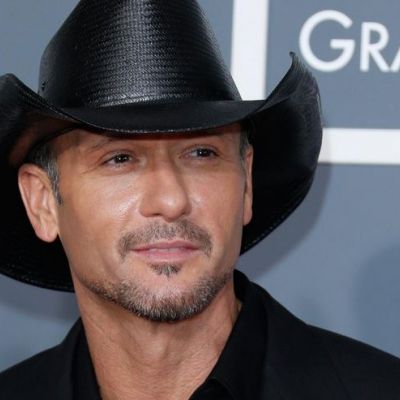Samuel Timothy Mcgraw is the real name of this Country music singer. Tim Mcgraw is another name for him. His birth nationality is American. Delhi, Louisiana, is his hometown in the United States. More information can be found in the table below.
Quick Facts
| Original name | Samuel Timothy McGraw |
| Celebrated Name | Tim McGraw |
| Gender | Male |
| Profession | Country music singer |
| Nationality | American |
| Born In | Delhi, Louisiana, United States |
| Birth Date | 1-May-67 |
| Age | 56 years old |
| Heights | 1.78 m |
| Height(s) Feet | 5 feet and 10 inches |
| Height(s) cm | 178 cm |
| Weight(s) | 81 kg |
| Weight(s) in pound | 178 pounds |
| Dating History | N/A |
| Marital Status | Married/Single/Divorced |
| Spouse | Faith Hill (m. 1996) |
| Children | Yes (Gracie McGraw, Maggie Elizabeth McGraw, Audrey Caroline McGraw) |
| Salary | N/A |
| Net Worth | $200 million |
Tim McGraw Biography
Tim McGraw was born on May 1, 1967. He is now 56 years old. His birthplace is Delhi, Louisiana, in the United States.
Tim McGraw Height And Weight
Tim Mcgraw stands 1.78 m tall. His weight is roughly 81 kg. The Weight can be changed at any time; we have included the most recent value here.

Career
Despite growing up in Start, Louisiana, a small town in Richland Parish, McGraw spent a lot of time in the cab of Smith’s 18-wheeler. In the truck, he would belt out songs by Charley Pride, Johnny Paycheck, and George Jones. “By the time I was six,” McGraw told Time’s Christopher John Farley, “I felt like I knew every album Merle Haggard ever recorded.” He also performed spirituals in church and show tunes in elementary school plays.
Despite having played Little League as a child, McGraw had given up his dreams of becoming a professional baseball player like his father by the time he entered college. He met Tug McGraw again as a senior at Monroe Christian High School, and he agreed to pay for his higher education. McGraw graduated with honors in 1985. Soon after, he changed his surname to match that of his biological father, though he still considers his stepfather, Smith, to be his true father.
McGraw enrolled in pre-law courses as a freshman at Northeast Louisiana State University after seeing the film And Justice for All, starring Al Pacino. However, he began to prefer parties over classes and became more interested in music. He bought a guitar at a pawn shop and was singing in clubs around Monroe, Louisiana, within a year.
He soon decided to drop out of school and try his luck in Nashville. His father advised him to finish school first, but McGraw reminded him that he had dropped out of college to play baseball. Furthermore, as McGraw told Dave McKenna in the Washington Post, “I only learned how to float a keg in college, and I didn’t think that would get me very far. So, even though it was a little frightening, I wasn’t giving up much. I thought I could pull it off.” His father continued to support him as he pursued a career.
McGraw arrived in Music City in May 1989 with no prior performing experience and no contacts. However, the market was ripe for smooth, handsome male vocalists, and he was able to secure gigs in Printers Alley clubs. Within a year and a half, he had landed a deal with Curb Records. His debut self-titled album was released in April 1993 but quickly went out of print. To gain attention, the label sent McGraw on tour with his band, the Dance Hall Doctors, and his live act was a huge success. He found his audience with power ballads and party hits like Steve Miller’s “The Joker.”
McGraw released the single “Indian Outlaw” in February 1994, and it quickly climbed the country charts and became a radio hit. It did, however, earn him unwanted status as a novelty act, as well as a harsh backlash from many who found it offensive to Native Americans. Lines like “I’m an Indian outlaw/Half-Cherokee, half-Choctaw/My baby she’s a Chippewa” and “You can find me in my wigwam/I’ll be beatin’ on my tom-tom” were included in the lyrics.
McGraw replied that he had meant no harm and had simply used the tribal names and other words for their rhyming qualities. The singer was also surprised by the outcry, as he had been closing his stage show with the song for four years.
Despite McGraw’s explanation, Cherokee Nation leader Wilma Mankiller sent a letter to radio stations claiming the song was “crass exploitative commercialism at the expense of Indians” and “promotes bigotry,” according to a Billboard article by Peter Cronin. As a result, radio stations in Arizona, Nevada, Oklahoma, and Minnesota began refusing to broadcast it. The Eastern Band of Cherokee Indians of North Carolina, on the other hand, wrote to McGraw’s management company in support of the song.
McGraw’s second album was released shortly after the uproar. In its first week on the charts, Not a Moment Too Soon was the number one country hit. In addition to “Indian Outlaw,” three other singles from the album reached the top of the charts. The album, as well as the number one single “Don’t Take the Girl,” a melodramatic ballad, won awards from the Academy of Country Music and Country Music Television. Billboard and others named McGraw the best new country artist.
Not a Moment Too Soon remained at the top of the country album chart for 26 weeks and sold approximately eight million copies over the next few years. McGraw went from playing honky-tonks to embarking on a major headlining tour almost overnight.
McGraw released All I Want the following year, in September 1995. Despite an attempt to demonstrate more serious musicianship, the first single released was the lighthearted “I Like It, I Love It.” As he explained to Billboard’s Deborah Evans Price, “It was a cool, enjoyable back-to-school song. It’s not particularly insightful. We released it because it’s a fun sing-along song that will draw attention to some of the album’s meatier songs, which I really want people to hear.” The song remained at number one for five weeks, and the album sold three million copies, but McGraw was largely overlooked at the 1996 awards shows.
Tim McGraw’s Wife, Marriage
Nonetheless, the Spontaneous Combustion tour, which featured country singer Faith Hill as the opening act, was a success in 1996. McGraw’s personal life was sizzling by the end of the tour, and he asked Hill, who has a laundry list of country music awards herself, to marry him. They were on tour in Montana at the time, and he proposed in his dressing room, which was housed in a trailer. In an interview with People magazine, he recalled the event, saying, “She said, ‘I can’t believe you’re asking me to marry you in a trailer house,’ and I said, ‘Well, we’re country singers, what do you expect?”
Hill later accepted McGraw’s proposal while on stage by writing “yes” on a mirror in his trailer, and the couple married on October 6, 1996. Their first daughter, Gracie, was born in 1997, their second daughter, Maggie, the following year, and their youngest daughter, Audrey, in 2001.
Tim Mcgraw Net Worth
Tim Mcgraw has a net worth of $200 million as of March 2024. He is living a very lavishing lifestyle at the moment




